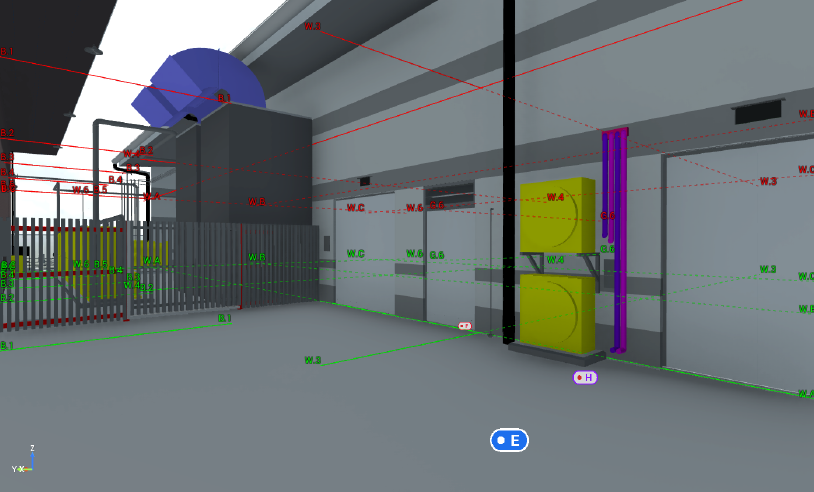
Digital Engineering Management (DEM) has emerged as a crucial discipline, particularly for complex assets such as airports and healthcare facilities. These projects demand intricate coordination, high precision, and compliance with rigorous standards. Digital Engineering ensures that construction is efficient and aligned with the asset’s lifecycle needs, integrating technology, data, and collaboration to deliver smarter, more sustainable projects.
Understanding Digital Engineering Management
Digital Engineering Management involves the strategic coordination of digital tools, processes, and data throughout a construction project. It encompasses Building Information Modeling (BIM), digital twins, cloud collaboration, and data-driven decision-making to optimize project delivery. A Digital Engineering Manager ensures technology is leveraged effectively to improve efficiency, reduce risks, and enhance asset performance.
For complex projects like airports and healthcare facilities, DEM is indispensable. These assets must function at a high standard, often involving stringent regulations, multiple stakeholders, and extensive integration of mechanical, electrical, and plumbing (MEP) systems. DEM ensures that every element of design, construction, and operation is meticulously planned and executed.
Key Aspects of Digital Engineering Management
- Expertise: Tailored BIM Execution Plans
We develop tailored BIM Execution Plans for each project, ensuring alignment with specific needs. For complex assets like airports and healthcare facilities, early setup and auditing are essential to maintain accuracy while meeting stringent delivery requirements. This proactive approach enables seamless integration of digital workflows from the outset.
- Auditing for Quality and Compliance
Regular audits are a cornerstone of effective Digital Engineering Management. These audits ensure the correct setup of digital models, maintain quality digital assets, and support clear communication among stakeholders. We employ an adaptable, project-specific checklist to conduct audits, ensuring compliance with all project requirements and industry standards.
- Real-Time Issue Tracking
Our Digital Engineering Systems provide real-time issue tracking to streamline problem resolution. We assign, monitor, and report issues efficiently, ensuring that challenges are addressed promptly. Clients can access this system via email, PC, and mobile devices, fostering transparency and collaboration throughout the project lifecycle.
- Facilities Management Data for Smooth Handover
Effective data management is critical for seamless project handover and ongoing asset maintenance. From the start, we establish structured data management processes to ensure facilities management data is continuously updated. At project completion, this data is finalized and delivered in the required formats, enabling efficient long-term asset operation.
- Enhanced Coordination and Collaboration
Airports and hospitals are intricate ecosystems with numerous interconnected systems. DEM facilitates seamless coordination between architects, engineers, contractors, and facility managers. Through centralized data platforms and collaborative BIM environments, teams can work with a single source of truth, reducing errors and miscommunication.
For example, in an airport construction project, multiple disciplines—such as structural engineering, HVAC, security systems, and baggage handling—must align perfectly. Digital Engineering integrates these elements into a cohesive framework, ensuring smooth execution.
- Improved Accuracy and Risk Mitigation
Errors in complex projects can lead to costly rework and delays. DEM leverages advanced simulation tools, clash detection, and real-time data analytics to identify potential issues before construction begins. This proactive approach minimizes risks and enhances efficiency.
For instance, in a healthcare facility, MEP systems must support critical medical equipment while ensuring optimal patient safety and comfort. Digital twins and 4D simulations allow project teams to anticipate and resolve challenges in advance, preventing costly disruptions.
- Compliance with Regulations and Standards
Airports and hospitals must adhere to strict regulatory requirements, including safety codes, sustainability guidelines, and operational standards. Digital Engineering Management provides robust documentation, automated compliance checks, and real-time monitoring to ensure that every aspect of the project meets the necessary regulations.
For example, in a hospital, adherence to infection control standards and air quality regulations is critical. DEM helps track these requirements digitally, ensuring that all construction and operational parameters align with industry standards.
- Lifecycle Asset Management and Sustainability
A key advantage of Digital Engineering Management is its ability to enhance the entire asset lifecycle. Through BIM and digital twin technology, facilities can be managed more effectively post-construction, optimizing maintenance, energy efficiency, and operational performance.
In airports, for example, digital models enable predictive maintenance of infrastructure, reducing downtime and enhancing passenger experience. In healthcare facilities, smart monitoring of energy consumption and HVAC performance can drive significant cost savings and sustainability improvements.
- Faster Project Delivery and Cost Efficiency
The integration of digital engineering processes streamlines workflows, reducing project timelines and costs. Prefabrication and modular construction—guided by precise digital models—enable faster on-site assembly, minimizing waste and improving efficiency.
For instance, modular prefabrication of hospital rooms can accelerate construction timelines while maintaining high-quality standards. Similarly, in airport projects, digital coordination of construction sequences prevents delays and optimizes resource allocation.
As the construction industry continues to embrace digital transformation, Digital Engineering Management will play an increasingly vital role in shaping the future of infrastructure development.
Give Draftech a call today to find out how we can assist you with Digital Engineering on your next Project.
Draftech – Your Project, Our Expertise
Testimonials
Very professional and efficient organization. Delivered a great product to a tight deadline.
ACE Power
Karl and the team are very professional and have a vast knowledge of BIM coordination.
Dwayne Willaims Babinda Electrics
We had multiple large projects with tight deadlines and needed a company we could trust. The teams delivery, attention to detail and understanding of what is being designed is always executed to a high standard.
Martin O’Donovan Envar Engineers
Draftech offered a flexible and reliable approach to working collaboratively with our team. They met our expectations and quality requirements and also offered up new ideas.
Draftech have proven to be a valuable and trustworthy resource and we will continue to work with Draftech on other projects.
Simon Marsden Umow Lai
Draftech is different from others in the professionalism and features they provide.
The ability to walk through projects in real time online provides invaluable insight into problem areas and helps provide an efficient resolution on the spot without many phone calls, emails and the necessity for us to paw through countless drawings to understand the issues.
Todd Morris Manager - Air mech
Draftech were put forward to FIP Electrical as the solution to Coordinate, Model, carry out clash detection, provide Electrical Services Shop Drawings, as built documentation and completed electrical model.
Simon Thorpe FIP Electrical
In close collaboration Draftech set up all our systems and model deliverables. In this process Draftech have proven to be a valuable resource for us and demonstrated commitment, understanding and professionalism.
David Skelley DJCoalition
Draftech’s attention to detail and proactive nature throughout the project assisted us in identifying issues before becoming evident on site, saving us both time and unexpected costs.
Matt Payne PJM Engineering Services
They delivered very high quality Revit models and associated 2D documentation at key milestones, working to a tight budget and in strict accordance with the Architects’ BIM requirements.
Peter Thomas Geoff Hesford
We found Draftech’s work to be of high standard and the team delivered exactly as agreed, in fact, when we considered the project complete, Draftech put further resources into the project as they were not satisfied.
John Johnson Beca
Engaging Draftech during design gave us the tools to make smart decisions.
Hansen Yuncken Design Manager - Michael Harkins
The drafting service is timely, reliable and fit for purpose for the built environment.
Peter Harvey Harvey Industries
Draftech stands apart from other drafting services that we have previously used in their attention to detail and ability to adapt to the individual client’s requirements.
Doug Holt McCaig Aircon
I can confidently recommend Draftech as a solid and reliable supplier, and experts in their field. I look forward to working with them again in the near future.
Chris Behan Norman Disney & Young
After seeing the benefits Draftech provided us on the Townsville Hospital Redevelopment we have set up a relationship with Draftech and intend to continue to use their BIM knowledge and skills for our future projects.
Brad Lund Energy Power Systems
Draftech has no competition as they are in a class of their own.
John Boyes Babinda Electrics
Draftech Developments Drafting and Design Capabilities, in conjunction with their outstanding level of Client service and support has provided great solutions to our engineering and Drafting Design portions within our Gorgon Barrow Island Project.
Aaron Hazelton Applied Electro Systems Pty Ltd
Draftech set up necessary systems and workflows very quickly, but also setup auditable estimating and weekly cost tracking processes that we utilised, requiring little maintenance.
TOM PURDON MPM GROUP




























